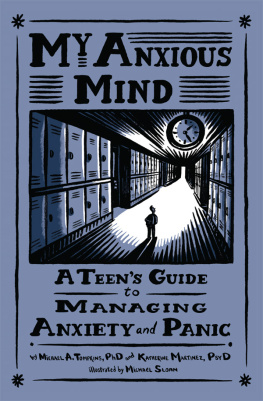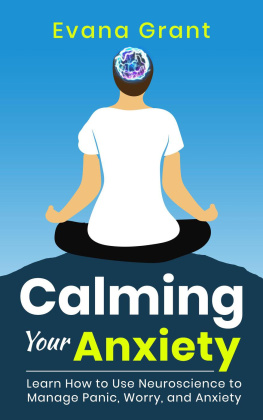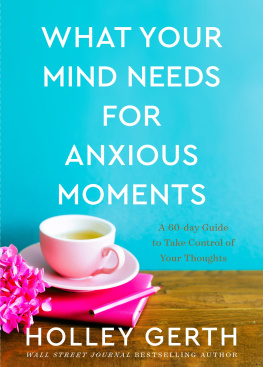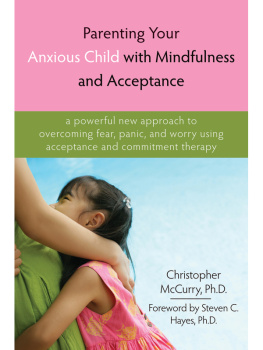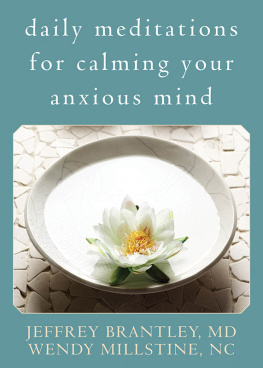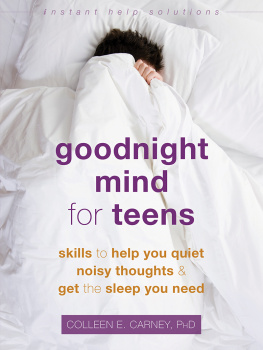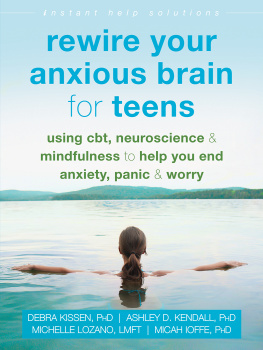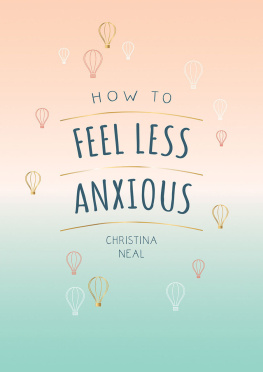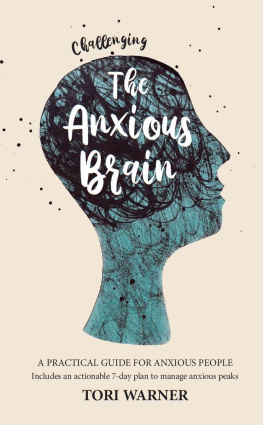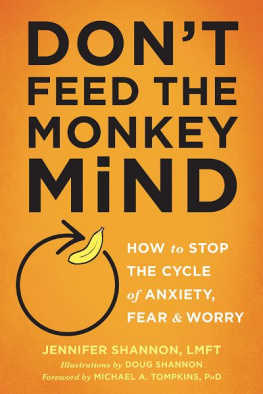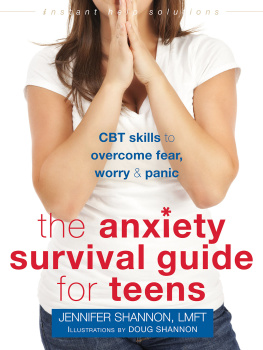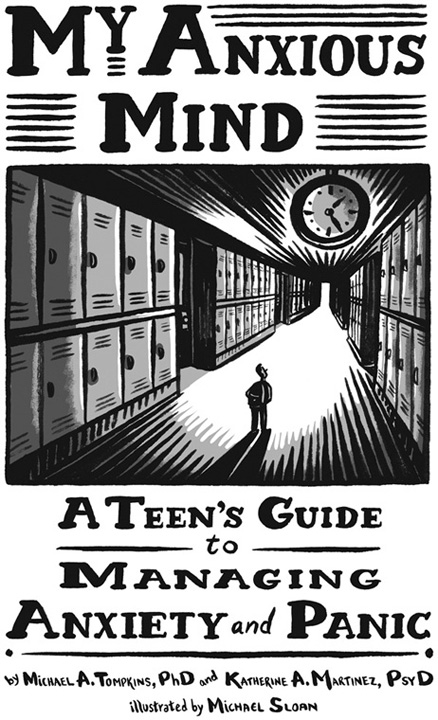CONTENTS
PRAISE FOR MY ANXIOUS MIND
My Anxious Mind is a terrific book! It contains easy-to-understand information and practical, straightforward steps anyone can take to reduce undue anxiety. Its a must read for anxious teens and their parents and teachers but will be helpful to individuals of any age who have an anxious mind.
Judith S. Beck, PhD
Director, Beck Institute for Cognitive Therapy and Research
Clinical Associate Professor of Psychology in Psychiatry, University of Pennsylvania
Past President, Academy of Cognitive Therapy
This wonderful book is a must buy for adolescents and their families with severe anxiety. Its two voicesthe recently affected adolescent and the experienced clinicianoffer invaluable insights into the potentially devastating effects of untreated anxiety while describing in detail proven strategies for taking charge of fears and obsessions.
Glen R. Elliott, PhD, MD
Chief Psychiatrist and Medical Director, The Childrens Health Council, Palo Alto, CA
Author of Medicating Young Minds: How to Know If Psychiatric Drugs Will Help or Hurt Your Child
The strategies discussed in My Anxious Mind are firmly grounded in the latest research on treating anxiety. At the same time, the book is highly accessible, engaging, and easy to follow. I highly recommend My Anxious Mind to any teen who struggles with high levels of anxiety. Their parents should read it, too!
Martin M. Antony, PhD, ABPP
Professor of Psychology, Ryerson University, Toronto
Author of The Anti-Anxiety Workbook
Up to one in five teens suffer from a significant anxiety disorder while countless others experience milder fears and worries. Tompkins and Martinez offer a step-by-step guide to anxiety management written specifically for adolescents. Along with proven techniques for dealing with anxious thoughts, physical symptoms of anxiety, and avoidance behaviors, this valuable book also addresses the important areas of sleep, nutrition, and exercise.
John Piacentini, PhD, ABPP
Professor of Psychiatry and Biobehavioral Sciences, UCLA David Geffen School of Medicine
Director, Child OCD, Anxiety, and Tic Disorders Program, Semel Institute for Neuroscience and Human Behavior, UCLA
My Anxious Mind: A Teens Guide to Managing Anxiety and Panic , is a marvelous book for teens who feel anxious or shy sometimes or find that anxiety or shyness is becoming too frequent and too painful. If anxiety is interfering with teens making friends, doing what they want to, asserting themselves, or asking for help, this is the book for them. Tompkins and Martinez have written this guide with precision and clarity, while communicating warmth to their young readers and a real understanding of the challenges of the teen-age years. How great it will be to have a personal guide for handling adolescent worries and thoughts about what look like impending social disasters; and for solving the inevitable interpersonal problems and challenges of dealing with those teens love, like, cant stand, and learn to like. Teens can all learn from these authors experience and wisdom.
Lynne Henderson, PhD
Director, The Shyness Institute, Palo Alto, California
Author of The Social Fitness Training Manuals
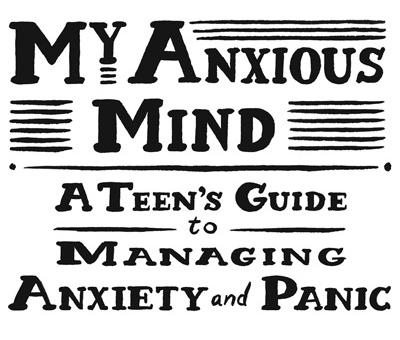
Magination Press American Psychological Association Washington, DC
My Anxious Mind: A Teens Guide to Managing Anxiety and Panic
Copyright 2010 by Magination Press
Illustrations copyright 2010 by Michael Sloan
All rights reserved. Electronic edition published 2011.
ISBN: 978-1-4338-1090-9 (Electronic edition)
For Madeleine and Olivia; not teens yet, but on the cusp MAT
For Jack, who teaches me every day KAM
Copyright 2010 by Magination Press. Illustrations copyright 2010 by Michael Sloan. All rights reserved. Except as permitted under the United States Copyright Act of 1976, no part of this publication may be reproduced or distributed in any form or by any means, or stored in a database or retrieval system, without the prior written permission of the publisher.
Published by
MAGINATION PRESS
An Educational Publishing Foundation Book
American Psychological Association
750 First Street, NE
Washington, DC 20002
For more information about our books, including a complete catalog, please write to us, call 1-800-374-2721, or visit our website at www.maginationpress.com.
Typeset in Sabon by Circle Graphics, Columbia, MD
Printed by Sheridan Books, Ann Arbor, MI
Library of Congress Cataloging-in-Publication Data
Tompkins, Michael A.
My anxious mind : a teens guide to managing anxiety and panic / by Michael A. Tompkins and Katherine A. Martinez ; illustrated by Michael Sloan.
p. cm.
ISBN-13: 978-1-4338-0450-2 (pbk. : alk. paper)
ISBN-10: 1-4338-0450-6 (pbk. : alk. paper) 1. Anxiety in adolescencePopular works. 2. PanicPopular works. I. Martinez, Katherine A. II. Title.
RJ506.A58T66 2009
618.92'8522dc22
2009011442
10 9 8 7 6 5 4 3 2 1
CONTENTS
NOTE TO READER
Think about how your life would be different if you were less anxious. What would change in your life? Would you try new activities or make new friends? Would you sleep better and have more free time because you study less?
Whether you are reading My Anxious Mind on your own, in a group, or with a parent, counselor, or psychotherapist, the tools and strategies described here may help you manage your worry and fear. We have helped many teens calm their anxious minds by creating individualized plans based on these tools. These tools are similar to those you might learn in cognitivebehavior therapy (CBT), a type of psychotherapy that teaches you to restore the ability of your mind and body to calm itself. We know CBT tools work, and we think they can work for you, too. We invite you to begin by completing the exercises and practicing the tools. You can work this practice into your daily routine. So, can you spare 30 minutes to feel less anxious?
Before you get started, we would like to offer some advice up front. We understand that no two teens are the same and that some things you read in this book may fit for you and other things may not. That is okay. We only ask that you use the tools and strategies that are helpful for your situation. And like so many things, success depends more on what you do than on what you want to do. Staying motivated to make a change will take some effort. Knowing that, we would like to encourage you to
- Take charge of your plan,
- Promise to keep going,
- Take small risks, and
- Admit the benefits of fear and worry and give them back!
TAKE CHARGE OF YOUR PLAN
If your teachers did not load you with so much homework or if your friends or family didnt stress you out so much, would you be less anxious? Maybe, but you can control how much these things affect you. You are in charge of your anxious mind, not anyone elsenot your parents, teachers, or friends. This may be tough for you to accept. However, taking charge is probably the most important and empowering step you can take. Taking charge means you do not blame your friends, your school, your parents, or yourself. Taking charge means taking back control. Taking charge also means leading the charge, not doing it all alone.
PROMISE TO KEEP GOING
Learning to calm your anxious mind will take time and practice. Even if you are very motivated to become less anxious, you will find that some days your anxiety is back. That is okay. On other days, you might not feel like doing anything. That is okay, too. It is hard to keep going after you have had a tough day and you wonder whether you will ever feel less anxious. But that cannot be a reason to stop practicing. Instead, try to promise yourself that you will work on your plan for at least three months and see what happens. And from time to time, take a look back. You will see that you are ahead of where you began. You are getting there, and that is progress that will help you to keep going.

